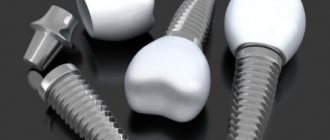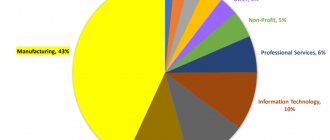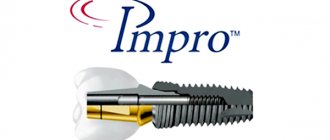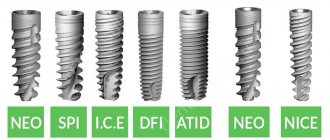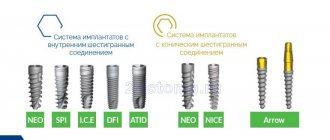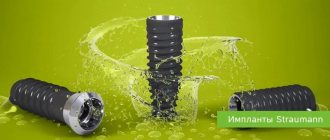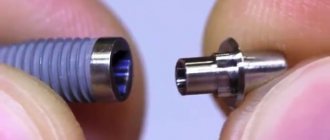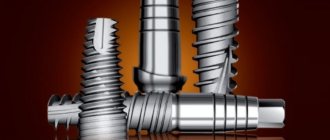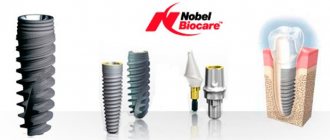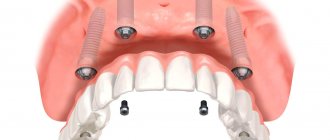Implants Noris Medical
relatively young, but have already proven themselves in the dental products market. This is an innovative development of the Israeli company Noris Medical, which began its work in 2010. She specializes in creating innovative, high-quality implant designs. The main feature of the company is a large range of products, which allows you to choose models for any patient.
Implants Noris Medical
The company complements other new types of products with reliable tools that make installation easier. This is one of the reasons why such implantation systems have earned a lot of positive reviews from doctors and patients around the world. Thus, the company’s offices today are located not only in Israel, but also in the USA.
Dental implant manufacturer Noris Medical
Almost 10 years of experience in the field of implantology have proven the professionalism of the company’s engineers. Noris Medical implants developed by them
and other countries have become a worthy alternative to premium designs such as Alpha Bio and Nobel.
The main difference of the company is its wide range. The line of implants from Noris Medical (Israel)
includes classic two-piece models for delayed and immediate loading, as well as single-piece and solid models, suitable for minimally invasive implantation methods.
Types of Noris dental implants
Noris Medical has implants
presented in several forms.
All of them are made from class 5 titanium alloys with micro- and macroscopic properties, due to which the engraftment stage takes place without problems or consequences. Noris Medical implants
have a rough surface - it is securely attached to the jaw bone due to the growth of bone tissue into the pores of the pin. It is the good contact of the product with the bone that allows implantation with immediate loading.
In general, Noris Medical implants
presented in the following series:
- Tuff (Tuff, Tuff Pro, Tuff TT). Two-piece implants equipped with three types of threads: the lower one - a cone-shaped zone, the middle one - with a noticeably wider belt, the upper one - in the form of a microthread. This ensures the best osseointegration.
- Onyx. Implants for installation in dense and hard bone type D1 or D2, without severe atrophy. The structures are cone-shaped with an outer diameter of 3.3-6 mm.
- Cortical. Implant systems designed specifically for immediate loading implantation techniques. To improve primary stabilization, the implants have sharp and wide threads. To further increase the stability of the structures, their surface is coated with calcium phosphate.
- Mono. The optimal option for a single restoration of a lost tooth, as well as for cases of complete edentia, provided that a beam or bridge structure is used. The implants are suitable for implanting lower front teeth, lower and upper lateral incisors. The Mono series has a wide range of sizes: diameter from 3 to 5 mm and length from 10 to 18 mm.
- MBI. High-quality monolithic models, ideal for patients with narrow bone tissue, as well as in cases of implantation with insufficient bone tissue, small mesiodistal space or in hard-to-reach places.
- Zygomatic. Zygomatic implants used for atrophy of the maxillary bone. Due to the increased length, it allows you to install pins in the zygomatic bone, where the bone tissue is denser.
Suitable for methods
- implantation with delayed loading,
- one-stage with immediate loading: all-on-4, all-on-6 and basal complex protocols,
- installation of an implant in the socket of an extracted tooth,
- inclined installation in conditions of acute tissue atrophy.
Kinds
- Tuff: root-shaped implants with three types of threads (narrow in the neck area, wide along the entire length and self-tapping in the apex area),
- Cortical: cortical implants, which are used for one-stage implantation. They have a wide thread with large blades, which ensures high primary fixation of implants, including in the cortical region,
- Onyx: cylindrical implants with cross sections at the apex. Suitable for delayed loading and installation in dense parts of the jaw bone without pronounced atrophic processes,
- MBI: thin monolithic implants, the thread of which allows the use of a compression method, that is, compaction of the bone. Designed for situations of atrophy and narrow bone tissue. Can be used for immediate loading,
- Mono: Monolithic implants that are designed to replace the lower incisors (front teeth) as well as the upper lateral incisors. Suitable for immediate fixation of dentures, but if possible without loading them,
- Zygomatic: these implants are analogues of the Zygoma model from Nobel (meet the same characteristics, but are more affordable). Designed for fixation in the zygomatic bone, that is, suitable for solving situations of acute bone tissue atrophy in the lateral distal sections.
Advantages
- use of hypoallergenic and biocompatible titanium alloy,
- microporous RBM surface to improve the degree of implant attachment in the jawbone,
- possibility of use for both delayed and immediate loading of the prosthesis,
- a wide range of abutments,
- minimal tissue trauma during installation,
- lifetime product warranty.
Features of dental implants
The main feature of Noris Medical products is a wide range of different implants. This allows us to find solutions even in the most complex clinical cases. The company also offers a large selection of abutments. They differ in shape and material, can be made straight or angular, there are options from titanium, gold-containing alloy and zirconium. Zirconium abutments have especially high aesthetics because they have a snow-white color. Noris Medical also offers multi-unit abutments designed for screw fastening of prostheses.
Other important features of Noris Medical implants
:
- Made from class 5 titanium alloy (Ti6Al4V ELI), which is completely compatible with the body and does not cause allergic reactions, which ensures a high degree of engraftment.
- External RBM coating, which is formed as a result of sandblasting with abrasives. Nanotechnology consists of creating a microporous structure that improves the process of osseointegration.
- Complementing the outer RBM coating with a layer of calcium phosphate. The introduction of such an innovation makes it possible to activate the process of bone tissue growth into the implant, which is especially important for simultaneous implantation.
- Different threads for each type of Noris Medical implant
: with narrow or wide petals, active or smoother. Each is designed taking into account the use of a specific implantation method, which allows taking into account the peculiarities of fixing the structure in bone of a certain density and volume. - Connection of the abutment and Noris Medical
implant using an “internal hexagon”. This connection is the most dense and durable, therefore it does not allow plaque and bacteria to accumulate in the lower part of the structure.
Applicable implantation techniques
Dental implantation "Noris"
Medical" suggests the possibility of carrying out the procedure with both immediate and delayed loading. It is also possible to restore both one tooth and the entire dentition. Manufacturer Noris Medical offers implants for the following protocols:
- All-on-4 and All-on-6 (with prosthetics with 4 and 6 support pins, respectively).
- Classic two-stage implantation with prosthetics 3-6 months after implantation of the pins.
- One-stage implantation, which allows you to restore lost teeth in 1 day.
- Zygomatic implantation, relevant for severe atrophy of the upper jaw bone.
Dental clinics working with Noris Medical implants
In just a few years of existence on the dental products market, implants of this brand have become widespread. Clinics working with Noris Medical
, can be found all over the world:
- "Stomika" (Minsk).
- "NovaDent" (Moscow).
- Kaiser (Frankfurt am Main).
- Zahnklinik (Essen).
- Uni-Dent (Warsaw).
- "Megadent" (Nur-Sultan).
For ease of installation, the manufacturer supplies tools along with the implants, so the principle of implantation using these systems is the same everywhere: in Belarus, Russia and the CIS countries. That is why when choosing a clinic for dental restoration using such implants, the fundamental factor should be the price, and in Belarus, as you can see below, it is lower than in other countries.
Features of implants
Use of quality material
In the production of Noris implants, Grade5 titanium alloy is used, which is characterized by increased strength and biocompatibility. It is completely safe for the body, has high performance characteristics and high-quality fusion with bone tissue. At the same time, due to the presence of third-party metals in the alloy, the manufacturer managed to significantly reduce the cost of its products and make implantation more accessible to a wide range of patients.
Porous coating RBM
Noris implants have an external porous or rough coating processed using RBM technology. Each implant is sandblasted with calcium phosphate, which has high resorbability and biocompatibility characteristics. Thanks to this technology, tiny pores are created on the surface of the implants, into which bone tissue cells grow, which ensures better and higher-quality engraftment of the implant in the jawbone.
Immediate Load Capabilities
The company primarily focuses on immediate loading, developing implant models designed for installation in conditions of acute bone atrophy and narrow alveolar ridge. Existing implant models can be installed at an angle, bypassing atrophied areas, leveling the position of the prosthesis using angular multi-unit abutments. Due to special threads and microporous coating, implants have a high degree of primary fixation, which allows them to be instantly loaded with a prosthesis without fear.
Use of the zygomatic bone for patients with acute atrophy
The Noris catalog includes elongated Zygomatic implants, which are designed for fixation in the zygomatic bone. They are used for installation on the upper jaw in the lateral, that is, distal, region. The implants have a thread on the top and a polished surface throughout the body, so they can be used in the presence of not only atrophied bone, but also inflamed periodontal tissue. Thanks to the smooth coating, bacteria do not accumulate on them, which protects against development and stops the inflammatory process.
Wide selection of abutments for prosthetics
The company develops a fairly large number of abutments - temporary, straight, as well as angular multi-unit. Their use is justified for immediate loading and screw fastening, as well as for inclined implants. Angled abutments allow you to align the position of the denture even if the implants were fixed at an angle, bypassing the most atrophied areas of the jawbone.
Turnkey Noris Medical implantation: compare prices
The turnkey price of
Noris Medical
is low, considering that it includes services not only for implantation.
The cost includes the patient’s accommodation in a comfortable hotel or apartment near the clinic, as well as transfer to the chosen location. It is also worth noting the fact that the turnkey price for Noris implants
in Belarus is much lower than in other European countries and Russia. The difference in cost can be seen in the comparison table.
| Region | Price of Noris Medical implants, ₽ |
| Europe | from 54 000 |
| Russia | from 30 750 |
| Belarus | from 16 600 |
Price for Noris Medical implants
The cost of products from Israeli brands is an additional plus. Noris Medical implant systems are no exception. One Onyx or Tuff implant will cost about 6,000 rubles, Cortical - from 9,000 rubles.
Zygomatic zygomatic implants represent the manufacturer’s most expensive offering. But they allow you to significantly save on All-on-4 implantation, which is now carried out using not only the Nobel Biocare implantation system, but also Noris Medical. Using such an alternative will not affect the final result of the treatment in any way and will help you achieve your perfect smile at an incredibly low price. Compare for yourself: the cost of installing four Noris Medical implants with fixation of a complete conditionally removable denture starts from 200,000 rubles. Prices for the same operation with the installation of Nobel Biocare implants start at 300,000 rubles.
Disadvantages of implants
Noris Medical designs have virtually no disadvantages. The only disadvantages include the increased risk of implant rejection during simultaneous implantation. But dentists working with these systems claim that this happens only in 2% of cases, and the reason here is most often the patient’s non-compliance with the doctor’s recommendations.
Service life and care recommendations
Noris Medical provides a lifetime guarantee for its products, but it is important to note that the service life of implants depends primarily on compliance with the dentist’s recommendations for oral care. The patient should visit the doctor regularly (at least once a year) for a preventive examination and professional cleaning.
It is equally important to clean your mouth 2 times a day using a soft brush and rinse your mouth after every meal. Dental floss can be used to clean the interdental space, and special brushes can be used to remove deposits in the lower part of the implant. When choosing pastes, you should avoid those that contain fluoride substances that can damage the surface of the implant. Following these simple recommendations will allow your implants to last 20 years or more.

